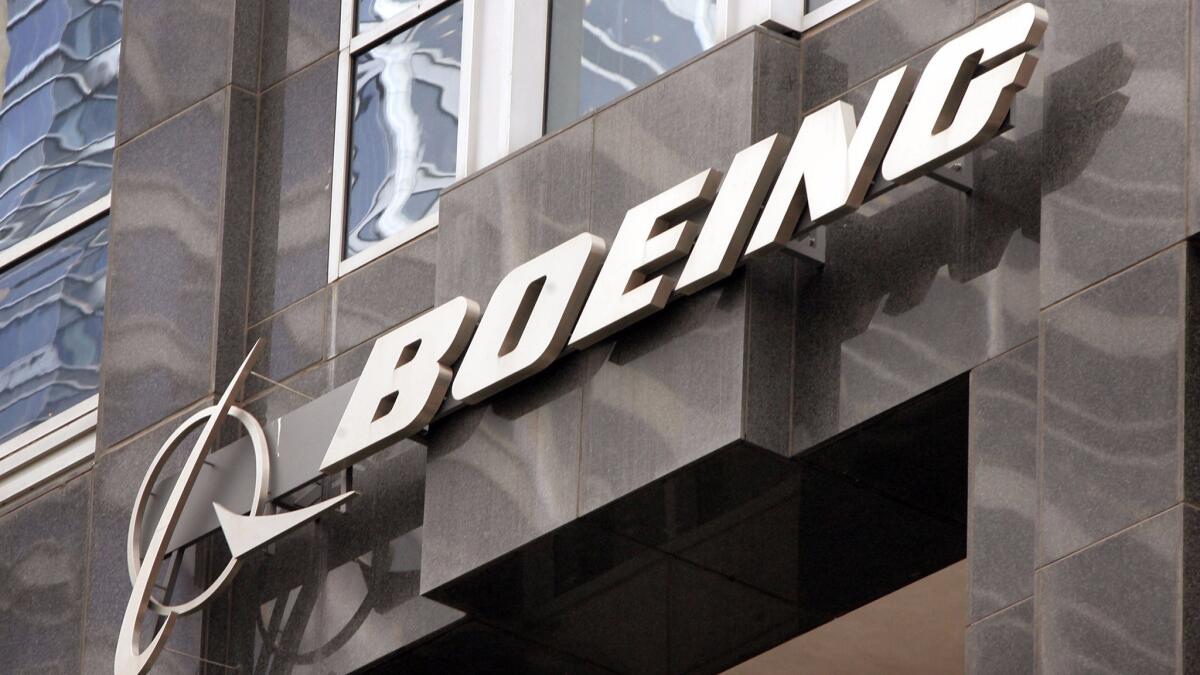Boeing illegally given $5.7 billion in tax breaks by Washington state, WTO rules

- Share via
U.S. plane maker Boeing received major illegal tax breaks from Washington state, a world trade body ruled Monday, adding that the federal government should now take action to end that support within months.
The Chicago-based company and the European Union, which backs Boeing’s key European rival Airbus, both claimed the ruling by the World Trade Organization as a victory in a longstanding battle for contracts between the two aerospace giants.
The WTO found that the support Washington state promised to give Boeing from 2024 to 2040 amounted to “prohibited” subsidies. The support offered by Washington came on condition that Boeing keep the production of the wings for the wide-bodied 777X plane in the state, effectively excluding foreign competition. Boeing has extensive plants around Seattle.
The 28-member bloc said the WTO had ruled that $5.7 billion in subsidies were illegal, out of a total $8.7 billion in measures that it reviewed. But Boeing called that figure excessive, and said only “future incentives” of $50 million a year were found impermissible in the WTO decision.
Appearing to counter both, a Geneva-based trade official, speaking on condition of anonymity because he was not authorized to speak publicly about the matter, said the ruling addressed only the legality of the measures, and not the possible financial benefit that could be drawn from the subsidy.
The ruling is but a part of a wider squabble involving accusations between the U.S. government and the 28-nation EU over support for Boeing and Airbus dating back to 2004.
“We are really the only party that can credibly come up with a figure,” said Boeing spokesman Tim Neale, referring to the value of the tax breaks. He said the $50 million per year was a “conservative estimate” and even over a 20-year span would only total $1 billion.
He said the EU effort was aimed in part to divert attention from a far more costly WTO ruling against Airbus two months ago.
EU Trade Commissioner Cecilia Malmstrom called Monday’s ruling “an important victory for the EU and its aircraft industry.”
“We expect the U.S. to respect the rules, uphold fair competition, and withdraw these subsidies without any delay,” Malmstrom said in a statement.
For its part, Boeing said it expected the European bloc and Airbus to appeal the ruling, saying the WTO had found that the U.S. company had not received any benefit yet from the 777X tax rate and wouldn’t until the plane is first delivered in 2020.
“Today’s decision is a complete victory for the United States, Washington state and Boeing,” Boeing General Counsel J. Michael Luttig said in a statement. “In rejecting virtually every claim made by the EU in this case, the WTO found today that Boeing has not received a penny of impermissible subsidies.”
Airbus President Fabrice Bregier argued the state’s support in the United States would allow Boeing to develop the 777X for free. He estimated the damage to Airbus and the European aerospace industry to be around $50 billion so far, “and that’s only for the 777X.”
The case could have some implications for President-elect Donald Trump’s ambitions to support U.S. business first and foremost. Rejecting some of the EU claims, the WTO found that only one of seven tax incentives provided by Washington state amounted to illegal subsidies for wings for the wide-body jet. In essence, the “prohibited subsidy” involved the reduction of the business tax rate on the condition that the wings were produced within the United States.
Airbus had already confidently predicted victory at the WTO over the Washington state tax incentives, saying during the latest tit-for-tat showdown in September that the alleged subsidies would “almost certainly be condemned as illegal.” Airbus had made that assertion after the trade body had found that the EU had provided billions of dollars in improper subsidies to the European plane maker.
UPDATES:
1:50 p.m.: This article was updated with additional comment from Boeing.
This article was originally published at 9 a.m.
More to Read
Inside the business of entertainment
The Wide Shot brings you news, analysis and insights on everything from streaming wars to production — and what it all means for the future.
You may occasionally receive promotional content from the Los Angeles Times.










